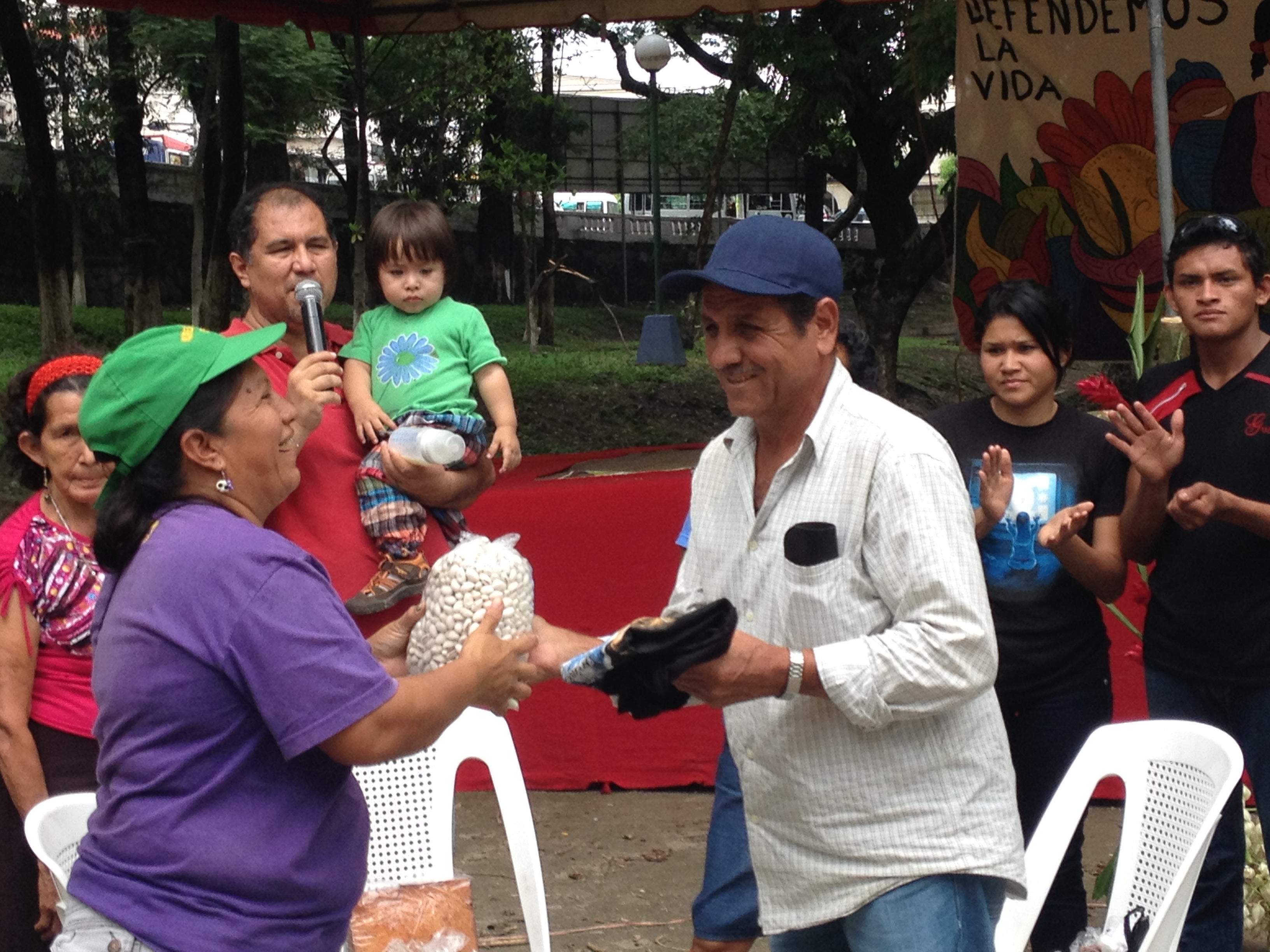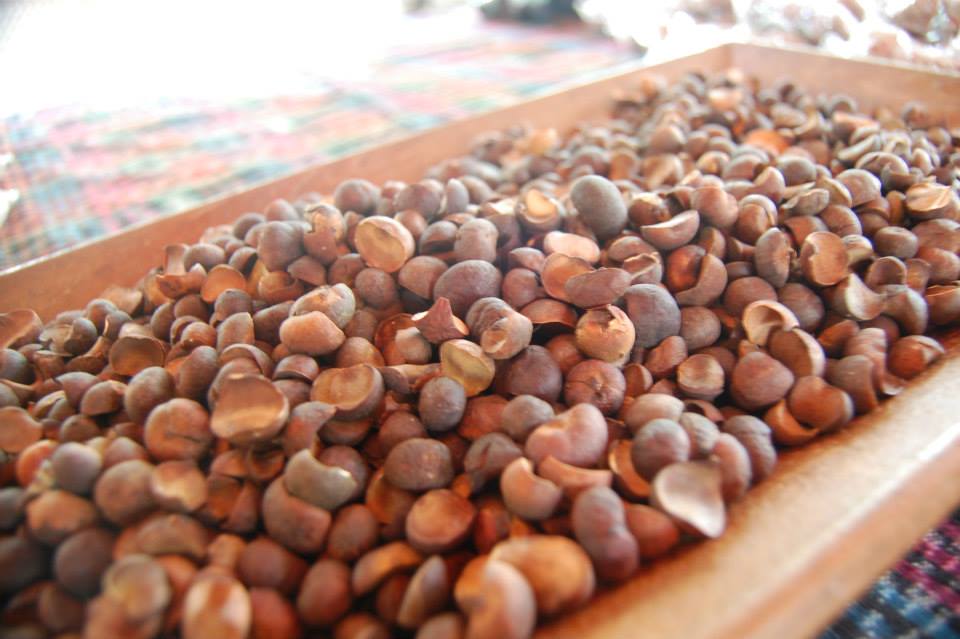By Kristi Van Nostran, Companionship Facilitator, RUMES, JH El Salvador, adapted with permission from more in-depth article by Voices on the Border, a Joining Hands organizational ally

Joining Hands partner, Ladislao, exchanges a bag of his Carnavalia beans for an artisan designed and printed t-shirt at the 12th Annual Native Seed Festival. Photo courtesy of Kristi Van Nostran.
29 Then God said, “I give you every seed-bearing plant on the face of the whole earth and every tree that has fruit with seed in it. They will be yours for food.” Genesis 1:29 NIV
With dark rainclouds overhead and soggy ground underfoot, still hundreds of people turned out on Saturday in Parque Cuscatlán, San Salvador’s central park, to celebrate the coming of the fertile season – the time to sow – participating in the 12th Annual Festival of Native Seeds. Representatives from at least 25 community and agricultural organizations came together, among them several Joining Hands Network members, to sell and swap native seeds, locally grown produce, natural medicines and artisan crafts, all prepared and grown free of chemical inputs.
Some 52 varieties of seeds were showcased at the festival; everything from beans and corn, squash, tomato and jicama, to lettuce, radishes and rice. Exhibitors and fair-goers agreed that with such an abundance of local seeds, there is no need to cultivate with seeds that have been genetically modified.

Dried ojushte seeds on display at the Joining Hands table at the 12th Annual Native Seed Festival. Photo courtesy of Kristi Van Nostran
Approximately 18 percent of national farmers sow native seed, however in recent years many sectors have been encouraging the cultivation of modified seeds. It is still unclear what affect these genetically altered seeds might have on the land or even the human organism, but what is sure is that they require large amounts of agrochemicals, which are known to be toxic to both. And the high costs associated with conventional farming are simply beyond what most smallholder farming families are able to pay.
RUMES, Joining Hands El Salvador, and numerous partner organizations working for food sovereignty believe strongly in the profound impact of native seed-saving and exchange opportunities, like the one celebrated this past weekend. Balmore, a small farmer and community leader shared, “When we present and exchange our own seeds we are strengthening the process of native seed production in the country. The more farmers believe in the effectiveness [of native seeds] the more self-sufficiency and income we will have in our communities.”
Over the last few years, as a result of the social and political advocacy carried out by countless community groups and social organizations, the Salvadoran Ministry of Agriculture and Livestock (MAG, for its initials in Spanish) has increased its commitment to the promotion of native seeds. Though, the Family Agriculture Program administered by the MAG has recently come under scrutiny by the U.S. Embassy and trade officials, claiming that the Ministry’s procurement of seeds for the seed distribution program violates the Central American Free Trade Agreement (CAFTA). Salvadoran farmers, however, argue that the seed distribution program provides real benefits to smallholder farming families and farming cooperatives, and that if there is a problem it is rooted in CAFTA and free trade.
Since 2004, the Ministry of Agriculture has sought to provide assistance to small farmers in the form of seed or other agricultural inputs. In a 2012 interview, Vice-Minister Hugo Flores told the UN Food and Agriculture Organization that “after 20 years of neo-liberalism – a model that has neglected subsistence farmers, which total some 325,000 in the country, and left them in a situation of extreme poverty – a targeted approach had to be put into action given the lack of technical assistance for these sectors, their limited access to funding from commercial or development banks, and the limited number of studies that have been done on the subject.”[1]
In the last two years, seed distributed through the Family Agriculture Program was purchased primarily from Salvadoran producers, and in 2014 one hundred percent of the seed was purchased directly from national growers. There are several reasons why it is more beneficial to purchase native seeds for the distribution program, not the least of which is that the money invested in the seed distribution program, $25 million in 2013, remains in the Salvadoran economy and generates jobs rural communities where they are needed most.
Also, by contracting with Salvadoran growers the quality of seeds is more easily monitored, and the government works with farmers providing technical assistance on the production of hybrid (naturally crossbred – NOT genetically modified) seeds that are able to better withstand El Salvador’s increasingly extreme climate, which can present drought and floods in the same growing season. In one farm cooperative member’s own words, “the seed program has strengthened our cooperative, both economically and technically. Before it was just transnational corporations that had the capacity to produce seeds [on a large scale], now we too have the technical capacity.”
Despite the obvious economic and social benefits, John Barrett, an Economic Advisor for the U.S. Embassy argues that allowing the Ministry to buy seed from domestic producers violates CAFTA. In layman’s terms, Section 9.2 of CAFTA states that if a government wants to buy seeds or any other goods or services, it must treat all interested vendors the same, without preference.
But it is no secret that transnational giants like Monsanto, the largest seed company in the world that controls the whole of the Central American seed market, are the ones that win out when all vendors must receive equal consideration. In the eight years since the signing and ratification of CAFTA in 2006, U.S. agricultural exports to El Salvador have doubled, reaching $467 million. While free trade has allowed for U.S. agribusiness to access Salvadoran markets, it has also served to stifle the Salvadoran economy and threaten the lives and livelihoods of farming families.
The Ministry of Agriculture’s seed distribution program, on its own, is only a short-term response to the issues of food insecurity and a depressed national agricultural sector. The incentive package amounts to a small agricultural subsidy of less than $100 per family, covering only part of the cost of producing a season’s harvest of corn and beans. Nonetheless, the program is very popular with the cooperatives that produce the seed and the farming families who receive them.
The incorporation of native seeds does add an element of sustainability, and over the longer-term, in combination with seed-saving and exchange initiatives, small farmers can build capacity, gain independence from government assistance, and begin to sow and celebrate true food sovereignty.
![]() You may freely reuse and distribute this article in its entirety for non-commercial purposes in any medium. Please include author attribution, photography credits, and a link to the original article. This work is licensed under a Creative Commons Attribution-NonCommercial-NoDeratives 4.0 International License.
You may freely reuse and distribute this article in its entirety for non-commercial purposes in any medium. Please include author attribution, photography credits, and a link to the original article. This work is licensed under a Creative Commons Attribution-NonCommercial-NoDeratives 4.0 International License.